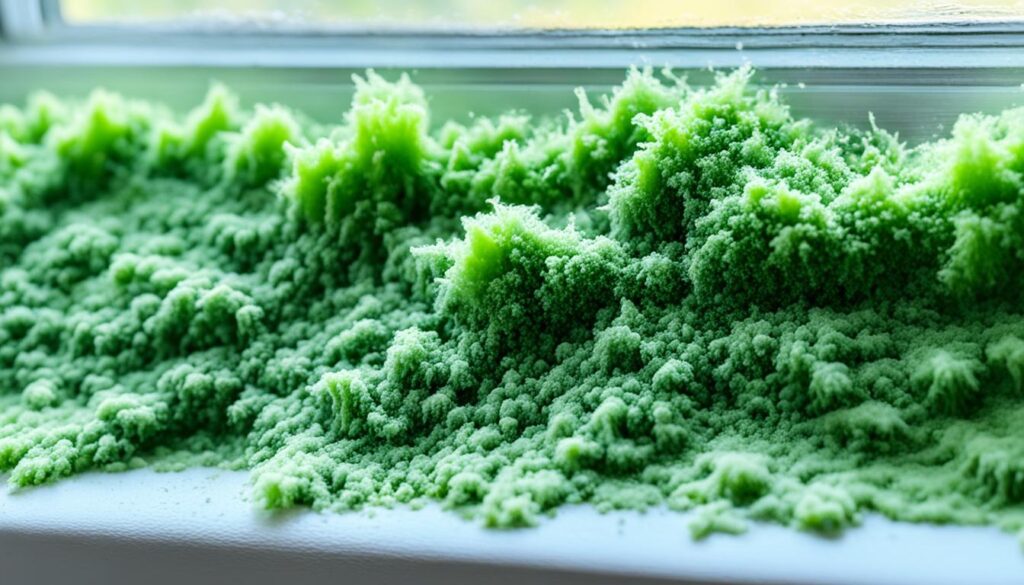
House Mold Symptoms Florida Residents Should Know
Living in Florida comes with its own unique set of challenges, and one of them is dealing with house mold. Mold is a common issue in many homes across the state, and it can have serious consequences for both the structural integrity of your house and the health of its occupants. As a Florida resident, it is important to be aware of the symptoms of house mold so that you can take the necessary steps to address the problem before it escalates.
Key Takeaways:
- House mold can have a detrimental impact on the structural integrity of your home.
- Exposure to mold can lead to respiratory issues, allergies, and skin irritations.
- Common symptoms of house mold in Florida include musty odor, water stains, and visible mold growth.
- Regular inspections, maintenance, and professional mold assessment services are essential for prevention and remediation.
- Recognizing the symptoms of house mold is crucial for maintaining a healthy living space.
Understanding the Impact of House Mold
When it comes to house mold, understanding its potential impact is essential for homeowners. Mold not only poses risks to the structural integrity of a house, but it can also have detrimental effects on the health of its occupants. By gaining insight into how mold can affect both the home and its residents, individuals can take proactive measures to mitigate these risks.
Mold growth can compromise the structural integrity of a house in various ways. It can infiltrate building materials such as wood and drywall, causing decay and weakening the overall structure over time. Additionally, excessive moisture and mold growth can lead to the development of rot, which further compromises the stability of the house.
Exposure to mold can also lead to a range of health issues. Inhalation of mold spores can trigger respiratory problems such as coughing, wheezing, and nasal congestion. People with existing respiratory conditions, allergies, or weakened immune systems may be more susceptible to these adverse effects. Prolonged exposure to mold can also cause skin irritations, eye irritation, and allergic reactions.
Exposure to mold can lead to respiratory problems, skin irritations, and weakened immune responses.
Moreover, certain types of mold produce mycotoxins, which are toxic substances that can have severe health implications. These mycotoxins can be released into the air and contaminate the indoor environment, posing additional health risks to residents.
Every homeowner should be aware of the potential impact of house mold. By understanding how mold can compromise the structural integrity of a house and recognizing the health risks associated with exposure, individuals can take the necessary steps to prevent or address mold issues effectively.
The Structural Impact of House Mold
Mold growth can infiltrate various areas of the house, including walls, ceilings, and floors. Over time, it can cause damage to these surfaces, resulting in discoloration, warping, and even deterioration. Not only does this compromise the aesthetics of the home, but it can also lead to costly repairs and renovations.
Furthermore, excessive mold growth can contribute to the development of rot, particularly in areas with moisture issues. Rot weakens the structural integrity of the affected materials, compromising their ability to support the weight and load of the house. This can lead to sagging floors, sinking foundations, and other serious structural issues if left untreated.
Health Risks Associated with Exposure
Exposure to mold can have a range of health effects, particularly for individuals with pre-existing conditions or weakened immune systems. Common symptoms of mold exposure include respiratory issues, such as coughing, wheezing, and shortness of breath. Allergic reactions, such as sneezing, watery eyes, and skin rashes, are also common among those exposed to mold. In some cases, prolonged exposure to certain types of mold and their mycotoxins can lead to more severe health problems.
It is important to prioritize the prevention and remediation of house mold to safeguard the structural integrity of the home and protect the health and well-being of its occupants.
Next, we will explore the common house mold symptoms that are frequently observed in Florida, shedding light on the unique challenges faced by local residents and offering insights into early detection and prevention strategies.
Common House Mold Symptoms in Florida
When it comes to house mold in Florida, recognizing the symptoms is crucial for taking prompt action. By understanding the common signs associated with mold infestation, homeowners can mitigate potential health risks and prevent further damage to their property.
Physical Symptoms
The physical symptoms caused by house mold exposure can manifest in various ways. Individuals living in mold-infested homes may experience:
- Respiratory Issues: Persistent coughing, wheezing, shortness of breath, and nasal congestion.
- Allergies: Increased frequency of allergic reactions, such as sneezing, itchy and watery eyes, and a runny nose.
- Skin Irritations: Rashes, itching, and irritation on the skin, often accompanied by redness or dryness.
Other Indicators
In addition to the physical symptoms, there are other indicators that may suggest the presence of mold in your home. These include:
- Musty Odor: A persistent, earthy smell that is often associated with mold growth.
- Visible Mold: Spotting clusters of mold growth or discoloration on walls, ceilings, or other surfaces.
- Increased Humidity: Excessive moisture levels, condensation, or water damage in certain areas of the house.
If you or your family members are experiencing any of these symptoms or notice any potential signs of mold, it is essential to take immediate action. Ignoring the problem can lead to further health complications and structural damage to your home.
In Florida’s humid climate, mold growth can occur more easily and rapidly. Therefore, monitoring your living spaces regularly and addressing any signs of mold promptly is crucial for maintaining a healthy environment.
To visually understand the impact of house mold and how it can affect your property, refer to the table below:
| Impact of House Mold | Health | Structural |
|---|---|---|
| Respiratory issues | ✅ | ❌ |
| Allergic reactions | ✅ | ❌ |
| Property damage | ❌ | ✅ |
| Odor | ✅ | ❌ |
As you can see from the table, mold can have significant health implications while also compromising the structural integrity of your home. Therefore, it is crucial to prioritize mold prevention and remediation to ensure a safe and healthy living environment.
Now that you’re familiar with the common house mold symptoms in Florida, it’s time to learn about effective prevention and remediation strategies. Stay tuned for the next section!

Prevention and Remediation of House Mold in Florida
Preventing and remedying house mold in Florida is essential for maintaining a healthy living environment. By taking proactive measures, homeowners can minimize the risk of mold growth and ensure the well-being of their families. Here are some practical tips and strategies to prevent and remediate house mold in Florida:
Regular Inspections and Maintenance
Regular inspections are crucial for early detection of mold issues. Conduct thorough inspections of your home, paying close attention to areas prone to moisture accumulation, such as basements, bathrooms, and crawl spaces. Look out for visible signs of mold growth, including discoloration, peeling paint, and musty odors. Promptly address any leaks, water damage, or plumbing issues to prevent moisture buildup.
Maintain Proper Ventilation
Proper ventilation is essential for reducing humidity levels and preventing condensation. Ensure that your home is well-ventilated by using exhaust fans in bathrooms and kitchens. Open windows regularly to promote air circulation and remove excess moisture. Consider using dehumidifiers in areas with high humidity to maintain optimal moisture levels.
Control Indoor Humidity
Maintaining indoor humidity levels between 30% and 50% helps inhibit mold growth. Use air conditioners and dehumidifiers in humid weather conditions to regulate moisture. Monitor and adjust humidity levels using a hygrometer to ensure a mold-unfavorable environment.
Properly Insulate and Seal
Insulate walls, floors, and roofs to prevent condensation and moisture buildup. Proper insulation helps maintain stable temperatures and reduces the chances of mold growth. Seal any cracks or gaps in your home’s exterior to prevent water intrusion and moisture penetration.
Effective Moisture Control
Take immediate action to address any water leaks or spills promptly. Dry wet areas within 24-48 hours to prevent mold growth. Use mold-resistant building materials, such as drywall, paints, and insulation, to minimize the risk of mold infestation.
Hire Professional Mold Assessment and Remediation Services
If you suspect or identify mold growth beyond your control, it is crucial to seek professional assistance. Certified mold assessment and remediation specialists have the expertise and tools to comprehensively assess mold issues, identify the source of moisture, and effectively remediate the problem. They can safely remove mold, mitigate spore spread, and restore your home to a mold-free condition.
“Preventing and remedying house mold in Florida requires a proactive approach, regular inspections, proper ventilation, and effective moisture control. When faced with persistent mold problems, don’t hesitate to seek professional help to ensure a healthy living environment for you and your loved ones.” – John Davis, Mold Remediation Specialist, Fix Mold Miami
By following these preventive measures and seeking professional help when necessary, Florida homeowners can create a mold-free living environment and safeguard the health of their families.
| Prevention and Remediation Tips | Benefits |
|---|---|
| Regular Inspections and Maintenance | – Early detection of mold growth – Timely repairs and addressing moisture sources |
| Maintain Proper Ventilation | – Reduces humidity levels – Prevents condensation |
| Control Indoor Humidity | – Inhibits mold growth – Ensures a mold-unfavorable environment |
| Properly Insulate and Seal | – Prevents moisture buildup – Reduces mold-friendly conditions |
| Effective Moisture Control | – Minimizes water damage risks – Prevents mold growth |
| Hire Professional Mold Assessment and Remediation Services | – Comprehensive assessment of mold issues – Effective mold removal and remediation |

Implementing these prevention and remediation strategies will help ensure a mold-free living environment and promote the well-being of your household. If you require professional mold assessment, prevention, or remediation services in Florida, contact Fix Mold Miami at 305-465-6653.
Conclusion
In conclusion, recognizing the symptoms of house mold in Florida is crucial for maintaining a healthy living space. Mold can have a significant impact on both the structural integrity of a house and the health of its occupants. By understanding the potential risks and consequences of mold exposure, homeowners can take proactive measures to prevent and address mold issues.
Identifying common house mold symptoms, such as respiratory issues, allergies, and skin irritations, can serve as early warning signs. It is important for Florida residents to stay vigilant and address any signs of mold promptly. Regular inspections, proper maintenance, and keeping indoor spaces dry and ventilated are key preventive measures.
To ensure a mold-free environment and safeguard the well-being of your family, it is advisable to seek professional mold assessment and remediation services. If you suspect mold growth or are concerned about the presence of mold in your home, contact Fix Mold Miami at 305-465-6653 for expert assistance. They specialize in professional mold assessments, prevention strategies, and effective remediation services in Florida.




